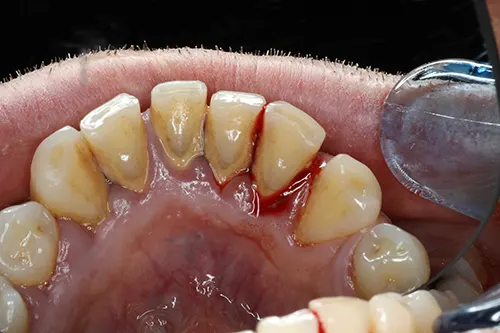
If you notice a little pink in the sink when you brush or floss, you might not think twice. But bleeding gums can be more than just a sign that you're brushing too hard — they can be an early warning signal of something more serious.
At Oyster Point Dental, we believe in catching problems early. Here’s why bleeding gums should never be ignored:
1. It Could Be Gingivitis — the First Stage of Gum Disease
The most common cause of bleeding gums is gingivitis, a mild form of gum disease caused by plaque buildup along the gumline. Left untreated, gingivitis can progress into periodontitis, a more serious condition that can lead to tooth loss.
Early signs of gingivitis include:
- Red, swollen gums
- Bleeding during brushing or flossing
- Bad breath that doesn’t go away
The good news? Gingivitis is reversible with proper dental care and good oral hygiene habits.
2. Your Oral Health Is Connected to Your Whole Body
Studies have shown strong links between gum disease and conditions like heart disease, diabetes, respiratory infections, and even Alzheimer’s disease. Inflammation in your gums can trigger inflammation throughout your body.
Ignoring bleeding gums could mean ignoring a bigger health issue in the making.
3. It Might Be a Sign of Poor Oral Hygiene
If plaque and bacteria aren’t removed regularly, they irritate the gums and cause them to bleed. Bleeding gums may simply be your mouth telling you that it’s time to improve your brushing and flossing routine — or time for a professional cleaning.
Tip: Brush twice daily with a soft-bristled toothbrush, floss daily, and schedule professional cleanings every 6 months.
4. You May Be Using the Wrong Technique (or Tools)
Brushing too aggressively or using a toothbrush with hard bristles can damage your gums. Flossing improperly can also cause bleeding. If your gums are consistently sore or bleed after flossing, let us show you the proper technique.
Gentle is effective. When it comes to gum health, technique matters more than force.
5. Bleeding Gums Rarely Get Better on Their Own
Even if bleeding seems to stop temporarily, the underlying issue often remains. Gum disease is a progressive condition, meaning it gets worse over time if untreated. Early treatment is the key to avoiding more complex — and costly — dental procedures later.
Don’t Wait — Get Your Gums Checked Today
At Oyster Point Dental, your oral health is our priority. If you're experiencing bleeding gums or other symptoms of gum disease, we’re here to help with gentle, effective, and personalized care.





